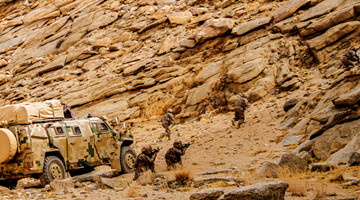JINAN, Oct. 11 (Xinhua) -- Every October, the terraces in Zhangjiaquan village in east China's Shandong Province are full of ripe apples ready to be picked and then shipped across the country.
"The orchards on the terraces receive plenty of sunlight and are well ventilated," said Liu Wenhe, Party chief of Zhangjiaquan village in Yiyuan County. "They bring considerable income to the village every year."
The terraces were built by locals in the 1970s under the leadership of Zhu Yanfu, then the village Party chief and a veteran who lost all his limbs and an eye in battle.
He later led the villagers to build more apple and peach orchards that now cover over 1,000 mu (about 66 acres) and are now the main source of income for the village lacking natural resources.
In late September, ahead of the 70th founding anniversary of the People's Republic of China, Zhu was awarded the national honorary title of "the people's role model," one of the highest state honors.
Zhu joined the People's Liberation Army in 1947 at the age of 14. In over two years, he fought in more than 100 battles during the civil war between the Communists and the Kuomintang forces.
In December 1950, Zhu was sent to fight in the Korean War. After a fierce winter battle that lasted three days and nights, he stood as the only survivor in his company.
Severely injured, Zhu fell into a coma for 93 days and underwent 47 surgeries. His legs were amputated below the knee, his hands were sawed off and his left eye was rendered blind.
Feeling useless, Zhu thought of committing suicide, but the deaths of his fellow soldiers gave him the courage to live on and devote the rest of his life to the building of a new country.
In the early spring of 1956, Zhu returned to his hometown. Re-learning how to perform everyday tasks became his first battle to overcome. After repeated practice, Zhu learned to eat, tie bandages, go to the toilet, as well as put on and take off his prostheses without assistance.
In 1958, Zhu became the Party chief of Zhangjiaquan, taking on the responsibility of leading the villagers to a better life.
Over the following 20-plus years, wearing prosthetic limbs and with the help of crutches, he led local villagers to grow over a dozen acres of new grain fields, drill more than 10 wells and build 1,500 meters of water channels.
After retirement, Zhu began to write books to document the lives led by him and his fellow soldiers. This task would prove equally challenging as his battle to adapt to life without limbs.
Yet the veteran emerged victorious once again. Over seven years, he published two autobiographical novels, "Ultimate Life" and "No Regret for Men." He became known as "China's Pavel Korchagin," after the paralyzed and blind protagonist in a popular Soviet novel.
"To live is to struggle; In struggles, one feels true and lasting happiness," reads the motto Zhu wrote in his autobiography.









